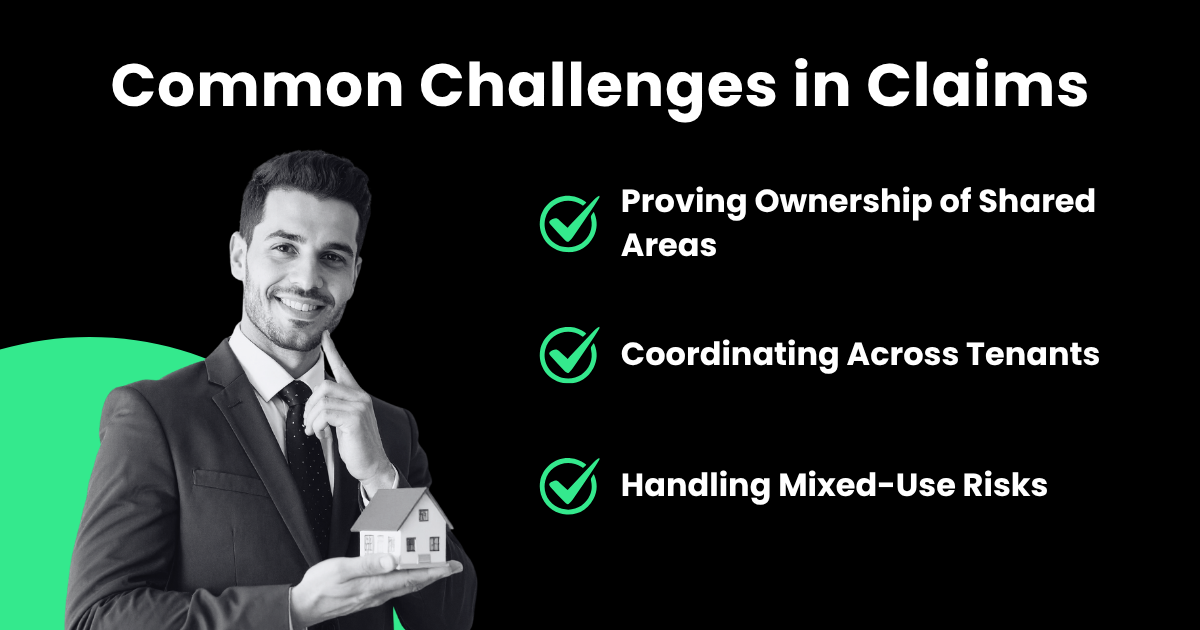Contents

Non-strata unit blocks aren’t governed by a strata scheme.
That means no shared insurance policy through a body corporate. Instead, you’re on the hook for comprehensive Non-Strata Insurance that covers the structure, common areas and any landlord-owned contents across all units.
Unlike strata setups, where common property risks are pooled, your policy must address everything from the building’s foundations to tenant-specific issues in individual units.
This setup offers flexibility but also demands precision. For non-strata landlords, getting the coverage right upfront is key to avoiding out-of-pocket surprises.
Common Challenges in Claims for Multiple Tenants

Filing a claim for a non-strata block isn’t just about one unit, it’s about the whole property and its residents.
Here are some hurdles landlords face:
- Proving Ownership of Shared Areas: Insurers often scrutinise documentation for common spaces like roofs, stairwells or parking areas.
Without clear title deeds or floor plans showing your full ownership, claims can stall. Incomplete proof of coverage scope can be a cause of delay. - Coordinating Across Tenants: If damage affects multiple units, say, a fire starting in one flat, gathering statements from tenants, loss-of-rent details and repair timelines becomes a juggling act.
- Handling Mixed-Use Risks: With various tenants, claims might involve tenant-caused damage (e.g., accidental spills) versus broader perils (e.g., vandalism).
Only a handful of claims may relate to tenant defaults but these can complicate recovery if not documented properly.
These issues aren’t insurmountable but they highlight why proactive preparation matters. It’s best to review your policy to ensure it explicitly covers these scenarios.
The Step-by-Step Process for Filing a Claim
The good news? Most insurers in Australia follow a streamlined claims process.
Here’s how it typically unfolds for non-strata unit blocks:
- Report the Incident Immediately: Contact your insurer within 24 to 48 hours. Delays can jeopardise approval.
Note the date, time and initial details. For multi-unit impacts, include a quick tenant headcount. - Gather Evidence: Document everything. Take timestamped photos or videos of the damage, from the affected unit to shared areas.
Collect tenant statements and police reports if vandalism is involved. - Submit the Claim: You can use your insurer’s app or portal. You’ll need your policy number, incident description and supporting docs.
For clarity and assistance, it’s best to contact your insurer directly, or if you have an insurance broker, get in touch with them.
Expect an assessor visit within days for larger claims. - Assessment and Approval: The insurer reviews for coverage fit. This can take 1 to 4 weeks depending on complexity.
- Repairs and Recovery: Insurer might coordinate with builders or they might get you to do this but if you have an insurance broker, they will work through all of this for you.
Don’t forget to track lost rent. Policies often cover up to 52 weeks for uninhabitable units.
Remember that payouts arrive in stages: emergency fixes first then full rebuilds.
Quick Tip: An insurance broker can liaise with the insurer on your behalf speeding things up without the hassle.
Documenting Property Conditions
Strong documentation is your best tool for hassle-free recovery.
Start with a baseline inventory before tenants move in. It’s easier to prove “before” versus “after.”
- Conduct Regular Walk-Throughs: Schedule bi-annual inspections of all units and common areas. Note conditions in a digital log with photos.
- Track Maintenance Records: Keep receipts for repairs, like gutter cleaning or electrical checks.
These can prove due diligence, reducing denial risks from “wear and tear” exclusions. - Use Tech for Efficiency: Apps (e.g., simple cloud folders) can make sharing evidence seamless.
For multi-tenant blocks, tag files by unit to streamline assessor reviews.
Choosing the Right Insurer for Non-Strata Coverage
Not all policies are created equal for non-strata unit blocks.
Standard Home and Contents Insurance won’t cut it. You need specific cover that includes building, liability and optional add-ons.
- Tailored vs. Generic Policies: Opt for those that have access to niche products. Off-the-shelf options often underinsure shared areas, leading to gaps.
- Key Features to Seek:
- Cover for fire, flood, storms and vandalism.
- Public Liability Cover for tenant or visitor incidents.
- Flexible excesses to balance premiums (higher excess = lower cost, if you can cover it upfront).
- Compare Annually: With premiums soaring due to inflation and weather trends, shop around. You can work with an insurance broker to compare quotes from multiple insurers to find the best fit without the legwork.
Pro Tip: Update valuations every 2 to 5 years to match rising rebuild costs.
Avoiding Claim Denials
Denials hit hard, often from overlooked details.
Here’s how to sidestep them:
- Disclose Everything Upfront: Share full property details during quoting including prior claims, tenant profiles or flood risks. Non-disclosure can void coverage.
- Maintain Actively: Regular upkeep prevents “known defect” rejections. Clean gutters quarterly to avoid water damage claims.
- Choose Wisely on Tenants: Screen for reliability to minimise default-related denials. Clear lease terms outlining damage responsibilities help, too.
- Review Exclusions: Understand what’s not covered, like gradual leaks from neglect. If denied, appeal via the insurer’s internal process or AFCA (free for disputes up to $1 million.)
By aligning your policy with these practices, you can boost approval odds and recover faster.
Work with Tank Insurance for Peace of Mind
Navigating insurance claims for non-strata unit blocks doesn’t have to disrupt your life or your income.
With the right preparation, from solid documentation to a policy that truly matches your setup, you can handle incidents like floods or fires with confidence.
If you’re a landlord feeling the weight of non-strata responsibilities, reach out to us at Tank Insurance via [email protected] or call us at 02 9000 1155.
As an insurance brokerage, Tank’s team can assess your current coverage, compare options and guide you towards hassle-free recovery.